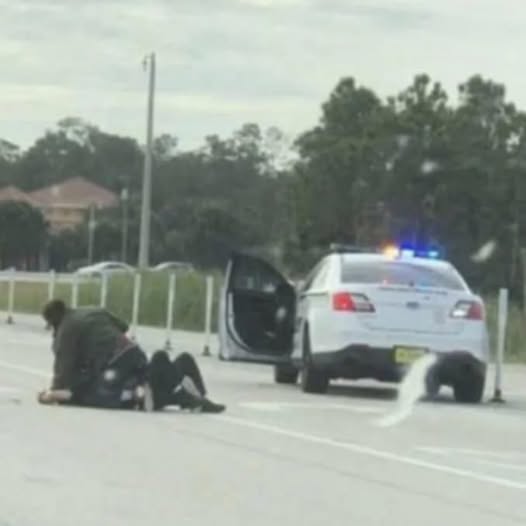In a split second, everything can change. A quiet highway, a routine traffic stop, and a random passerby were all thrust into a life-or-death situation—one that would end in tragedy for one man and a legal and moral reckoning for another.
It happened on Interstate 75 in Lee County, Florida. Ashad Russell, a 35-year-old man with a concealed weapons permit, had been driving like countless others that day, probably focused on errands or work. But fate had other plans. As he approached a patrol stop on the shoulder of the road, he noticed something that made him slow down—a violent struggle unfolding between a sheriff’s deputy and another man on the pavement.
The deputy, identified as First Class Deputy Dean Bardes, had reportedly pulled over 53-year-old Edward Strother for speeding. What should have been a standard traffic stop escalated without warning. Witnesses later said that Strother exited his vehicle and launched a physical attack on Bardes. What Russell saw was terrifying: the officer pinned to the ground, being punched repeatedly and unable to break free.
Instinct and training took over. Russell, legally carrying a firearm under Florida’s concealed carry laws, stopped his vehicle and approached the scene. The chaos was unfolding so quickly that there was no time for hesitation. Russell moved closer, weapon drawn. Deputy Bardes, clearly overpowered and in a vulnerable position, noticed Russell’s firearm and pleaded for help.
“Shoot him!” the officer reportedly yelled.
Russell shouted warnings, ordering Strother to stop the attack. But Strother did not relent. With the deputy’s life hanging in the balance, Russell fired his weapon—three shots aimed at Strother’s neck. The man slumped over and died almost instantly. The violence had ended as abruptly as it began, leaving behind a haunting silence on the side of the road.
What followed was an intense legal and public debate. Was Russell a hero or a vigilante? Did he do what was necessary—or what was excessive? These were the questions the community, and ultimately the legal system, had to consider.
The Lee County Sheriff’s Office quickly launched an investigation. Emotions ran high as the case made national headlines. Sheriff Mike Scott publicly praised Russell in a Facebook post, calling him a man who did what had to be done under unimaginable pressure. As the facts were reviewed, the Florida State Attorney’s Office stepped in to determine whether charges would be filed.
Their decision came with clarity: Ashad Russell would face no charges. According to the official statement, Russell was “justified in using deadly force when he reasonably believed that the use of such force was necessary to prevent imminent death or great bodily harm to Deputy Dean Bardes.” The State Attorney’s Office confirmed that their review was closed and no further legal action would be taken.
For many, Russell became an example of civilian courage—a man who didn’t turn away in fear, but acted to save the life of a stranger. Yet, not everyone shared that view. Edward Strother’s brother, Louis, spoke out in an interview with The Washington Post, expressing disbelief and outrage over how the incident was portrayed. “They’re calling him a good Samaritan?” he said bitterly. “Was my brother even armed?”
The question lingers. Strother, according to reports, had no weapon. But the law in Florida does not require the attacker to be armed for deadly force to be deemed justified—only that the threat posed could result in serious harm or death. For the legal system, Russell’s actions met that threshold. For Strother’s family, it wasn’t justice—it was a death without answers.
This event, though it originally occurred in 2017, continues to be a lightning rod for discussions about civilian intervention, use of force, and how quickly lives can be changed by a single decision. Russell’s life was forever altered by the shots he fired. Deputy Bardes owes his survival to a stranger who chose action over indifference. And the Strother family continues to mourn a man who died on the asphalt under circumstances they may never fully accept.
In the end, this story is not just about a traffic stop gone wrong. It is about the thin and fragile line between heroism and tragedy, law and morality, survival and loss. It is a reminder that courage can come from unexpected places—but so can grief.
